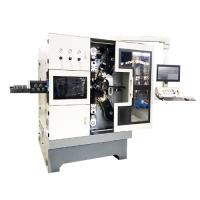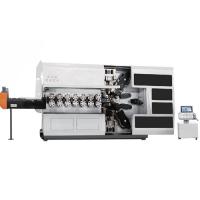压簧机
数控弹簧卷簧机涵盖2至9轴机型,适用于压缩、拉伸、扭转及异形弹簧的自动化生产。广泛应用于工业制造、汽车、军工及仪器仪表领域,可加工直径低至0.1毫米的金属丝。

6轴电脑数控弹簧机 CSM-6160CNC

电脑数控卷簧机(7轴) JTC 720


8轴电脑数控弹簧机 CSM-8250CNC

二轴电脑数控卷簧机 TK-208


电脑数控卷簧机(9轴) JTC 960


电脑数控卷簧机(6轴) JTC 650

CNC spring coiling machines (also known as "compression spring making machines") are widely used type of spring making machinery for producing compressions springs (helical, cylindrical, conical, and contoured springs) and spring washers by cold coiling methods.CNC spring coiling machines can be divided into two types: single-point coilers and double-point coilers.
Dual-point spring coiling machines.
Dual-point coilers have two coiling points that make contact with the wire to coil it into the correct shape. This coilers are good to producing straight compression springs. Because of two contact point, machine can decrease friction when coiling. The second coiling point adds four dimensions of mobility that can affect coil diameter and pitch. Second point of contact can reduce wear and tear on other tooling in the system. Furthermore, the need for a precisely formed arbor is eliminated by adding the second coiling point to the spring coiling system.Single-point spring coilers function with the same principles, but utilize only one coiling point. In order to coil wire, all coilers must make contact with the wire in at least three areas. Since they have only one coiling point, single-point coilers require an arbor for coiling. Dual-point coilers only require an arbor for cutoff.
Single-point spring coiling machines.
Single-point spring coilers are more versatile in the types of springs they can produce. Straight-leg torsion springs and magazine springs can also be produced on standard single-point coilers, whereas dual-point coilers would require modifications.
Basic components of spring coiling machines:
- Feed Rollers: These circular components are one of the most prominent features on many spring coiling machines. As they turn, they pull the wire from the reel and into the wire guides. Feed rollers often feature three grooves of different sizes, corresponding to the same grooves in the wire guides.
- Wire Guides: Wire guides are flat components containing grooves of varying size that match those on the feed rollers. The groove size doesn’t have to match the wire exactly, but it does have to be within a specified range. Wire travels through wire guides before reaching the block guide, the arbor or the coiling point.
- Block Guide: As wire exits the wire guides, it meets the block guide. This component ensures that the wire continues on the right path to the coiling point. The groove at the bottom of a block guide must be accurately machined to match the wire’s diameter.
- Coiling arbor: At the same time that the wire passes through the groove of the block guide, it passes over and around the arbor. In single-point coilers, the arbor represents the third point of contact at the point of coiling. Spring physics demand at least three points to coil wire; dual-point coilers have a third point in the additional coiling point, and so the arbor is not as necessary.
- Pitch Tool: By sliding up and down and moving the wire along a sloped surface, the pitch tool precisely controls the pitch of the spring. Like the arbor, this component is also carefully machined to fit each job.
- Coiling Point: The coiling point is the component that pushes the wire into a coiled shape by deflecting its trajectory. Setup parameters determine exactly the angle at which the wire is deflected, which in turn determines the spring index, diameter and overall shape of the spring. One notable difference between spring coilers is the number of coiling points. See this post for an overview of single-point and dual-point spring coilers.
- Cutter: When a coil has reached its desired length, the cutter slices the wire to create a separate spring. Depending on the coiling direction, the cutter may be positioned above or below the arbor.
Where to buy reliable CNC spring coiling machines from China, Taiwan (R.O.C.), Korea?
On our website you can profitably buy any CNC spring coiling machines from well known world manufacturers with delivery to your region. All our machines have low cost, high quality, reliability and productivity. We provide commissioning service, training, warranty and post-warranty maintenance, as well as supplying machine tool accessories and spare parts.